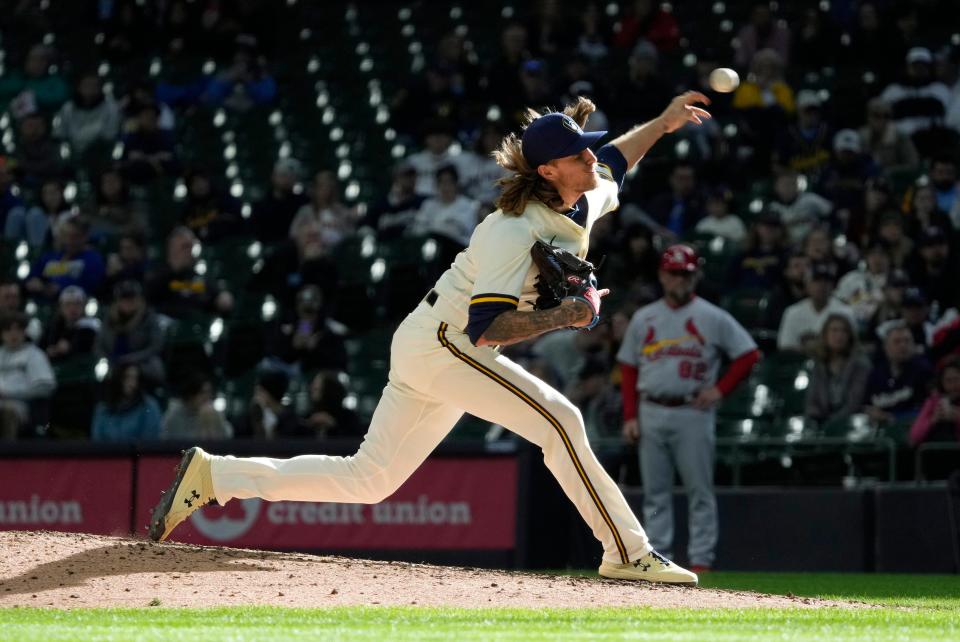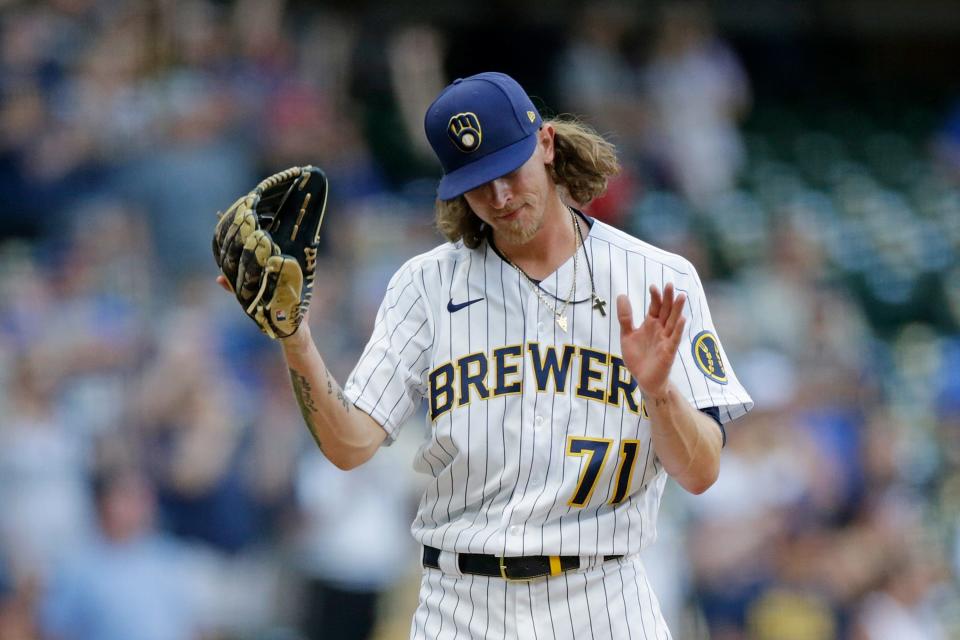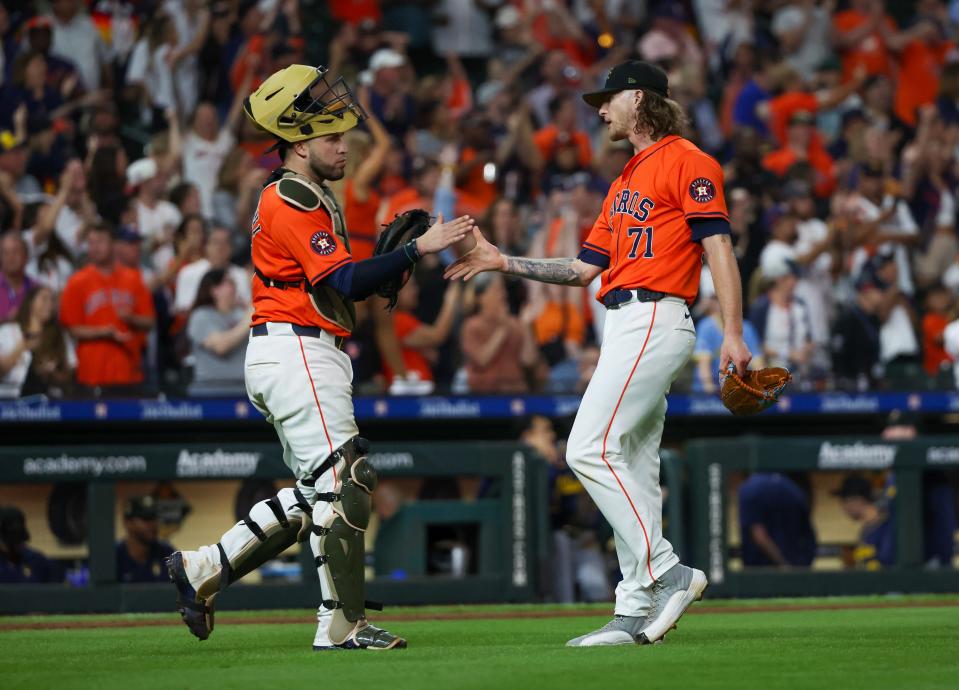Josh Hader and agent admit to ESPN they crafted usage guidelines after losing arbitration case to Brewers
Most Milwaukee Brewers observers noticed that something changed in how the team used relief standout Josh Hader after the 2019 season, and it turns out there was a good reason.
Hader and agent Jeff Berry, speaking to ESPN writer Buster Olney, detailed how the result of an arbitration hearing before the 2020 season led to Hader requesting different rules around his usage. The left-handed closer was dealt to San Diego in a controversial trade at the 2022 trade deadline, then signed with Houston this offseason. He got his first career save against the Brewers on Friday, meaning he now has saves against all 30 big-league clubs.
Hader became used almost exclusively in save situations and in one-inning stints — often the ninth — beginning in 2020, a dramatic departure from his deployment in 2019 and earlier, when his flexibility made him one of the most powerful weapons in Milwaukee's arsenal.
The timing of the shift isn't an accident. After the 2019 season, Hader sought $6.4 million in arbitration but lost his case to the Brewers and made $4.1 million instead. That was a raise after he made $687,600 the year before, but it illustrated the dramatic gulf between what the team (or arbitration system) and player felt was deserved.

Why did the arbitration hearing outcome impact how Josh Hader wanted to be used?
The quirk of the arbitration system, it seemed, was that it still deeply valued saves for relief pitchers, even as the larger baseball ecosystem had de-emphasized the importance of that statistic and Hader's usage wasn't geared specifically toward the ninth inning.
"Berry recalled Patrick Houlihan, the executive vice president of Major League Baseball labor relations, opening his argument by saying that Berry and Hader were trying to change 40 years of precedent, referring to the importance of saves in similar hearings. True or not, Berry felt it a disingenuous argument, given how the Brewers had deployed Hader.
"'What I heard in that room was how they valued relievers,'" Hader recalled, "'and it was 100% based on saves.'
"Even so, when a union lawyer called Berry to tell him that Hader had lost, he was shocked. When he spoke with (then Brewers general manager David) Stearns for the first time after the decision, Berry said Stearns' response seemed to be: Sorry, that's the system. Berry remembers Stearns' kicker: 'He'll make his money in free agency.'"
Berry said in discussing the outcome with Hader, they arrived at what they believed was a just compromise: Hader would dictate a set of rules about his usage, working primarily in save situations, one inning only and not on back-to-back days (with exceptions). That would maximize his potential future earnings.

Why did the team agree to Josh Hader's conditions?
Berry conveys in the story that Stearns was initially taken aback by the proposal, but the Brewers risked a public feud with a star player if Hader's conditions weren't met. Olney spoke to then-manager Craig Counsell, a former player who sounded sympathetic and accepting of the situation.
"It's hard to disagree with it," Counsell said. "I think Josh had worked really hard up to that point, and done whatever the team had asked him to do. More than anything, Josh was trying to stay healthy. … How can I not agree with that? Especially after what he had done."
Indeed, Hader remained a force of nature and key component to Milwaukee's division title in 2021. When he was dealt in 2022, even after one of the toughest stretches of his career, the transaction became a flashpoint for frustrated fans when the Brewers fell from a three-game lead in the National League Central to missing the playoffs. The plummet included seven losses over the final two months of the season following Hader's departure when the Brewers had a lead in the seventh inning or later.
What did Josh Hader say about his drop in multi-inning outings while with the Brewers?
When asked directly about the change in usage in early 2022, Hader hinted at the reality without saying it concretely.
“For me, it’s about being able to get into a routine and really understand how my body works, be prepared for each and every single game and just kind of test the limits of how many times I can go out there,” Hader said.
“You know what to expect, right?” Hader said. “I have a routine that I’m able to prepare for. I know that the game is gonna dictate when I go in, but I know that around the sixth, seventh inning, I’m starting my routine. Whether I’m getting in the game or not, you just go from there. Everything just tailors from that starting point.”
Hader's early career included outings like a remarkable showing against the Cincinnati Reds on April 30, 2018, when he struck out eight batters over a stretch of eight outs to lock down a 6-5 save. He worked 33 outings of more than three outs in 2018, including 23 of two innings or more. In 2019, it was 23 outings of more than one inning, and 14 of two or more.
In the pandemic-shortened 2020, he worked just one outing of exactly four outs. He had zero such outings over the next three seasons in advance of free agency, including during his time in San Diego.

Both the Brewers and Josh Hader seem to have gotten what they wanted
Both sides seem to have ultimately benefited. Now having reached free agency and cashed in to the tune of five years and $95 million, Hader now logically feels at liberty to work longer stints, and he's recorded three appearances of four outs or more with Houston.
The Hader trade set dominoes in motion that helped the Brewers; prospect Robert Gasser is now in the big leagues, and prospect Esteury Ruiz was dealt in a three-team deal that brought the Brewers an MVP candidate in William Contreras.
The Brewers, did, however, experience another contentious arbitration process in advance of 2023 when Corbin Burnes blasted the organization following a hearing that went the team's way. Burnes still delivered an excellent 2023 season and led the Brewers to a division title before getting dealt this offseason to Baltimore.
This article originally appeared on Milwaukee Journal Sentinel: Josh Hader insisted on usage rules with Brewers after arbitration case

